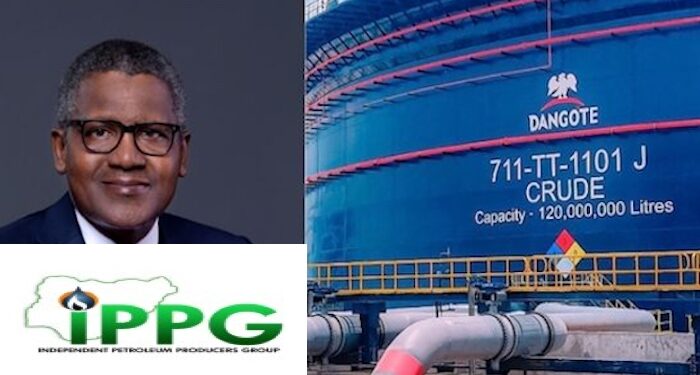The Independent Petroleum Producers Group (IPPG), an association representing indigenous oil and gas-producing firms in Nigeria, has voiced strong opposition to President Bola Tinubu’s directive mandating the sale of crude oil to Dangote Refinery and other local refineries in naira. The group has called on the Nigerian National Petroleum Company Limited (NNPCL) to utilize its allocated crude oil volumes to address the current supply shortages affecting local refiners.
In a letter dated August 16, 2024, addressed to the Chief Executive of the Nigerian Upstream Petroleum Regulatory Commission (NUPRC), Mr. Gbenga Komolafe, IPPG Chairman, Mr. Abdulrazak Isa, articulated the group’s position. He argued that the NNPCL should use its intervention crude oil volume of 445,000 barrels per day to stabilize the situation, as it has done in the past.
Isa explained that while some IPPG members are already supplying crude oil to local refineries, the NNPCL is best positioned to address the shortfall in crude supply to local refiners by leveraging its statutory crude allocation for domestic consumption.
“Historically, NNPC has always had an intervention crude oil volume (445kbopd) meant to satisfy the nation’s domestic consumption. This volume has always been used, under various swap mechanisms, to import refined products for domestic consumption,” Isa stated. He suggested that this dedicated volume should now be reserved for all domestic refineries under a price hedge mechanism that could be facilitated by a financial institution like Afrexim Bank.
Isa emphasized that any crude oil production above this allocated volume should be treated as export volumes, adhering to the willing-buyer, willing-seller framework of the international market. This approach, he argued, would allow refiners to export excess products that surpass domestic demand, thereby boosting foreign exchange earnings.
The IPPG also expressed concerns over recent developments, including the domestic crude oil refining requirements and production forecasts announced by the NUPRC for the second half of 2024. Isa pointed out that some IPPG members had received letters from Dangote Refinery requesting crude supply nominations for October, which he said conflicted with the willing-buyer, willing-seller framework established by the Petroleum Industry Act (PIA) 2021.
Isa called for an amicable solution that respects existing commercial agreements, economic interests, and business models within the oil and gas sector. “While we fully support and commend the efforts of Nigerian entrepreneurs to enhance domestic refining capacity, it is important that no private sector business is unduly pressured into arrangements that may effectively subsidise another within the oil and gas value chain under any guise whatsoever,” he stated.
The IPPG chairman also raised concerns about the potential impact of the NUPRC’s allocation methodology on foreign exchange earnings through royalties and taxes. He called for transparency in the allocation process and requested that IPPG be allowed to provide input into production forecasts to ensure they accurately reflect operational realities.
“We understand that the current allocation methodology appears to be based on a matrix of production forecasts by producers, issued technical allowable rates as well as crude oil requirements of domestic refineries, rather than actual local consumption needs. This raises significant concerns as it suggests that allocations are being determined based on the demands of refiners, which may exceed what is needed for domestic consumption,” Isa noted.
The IPPG concluded by urging the NUPRC to provide clear details on the allocation criteria and methodology, emphasizing the need for transparency and fairness in the process.


